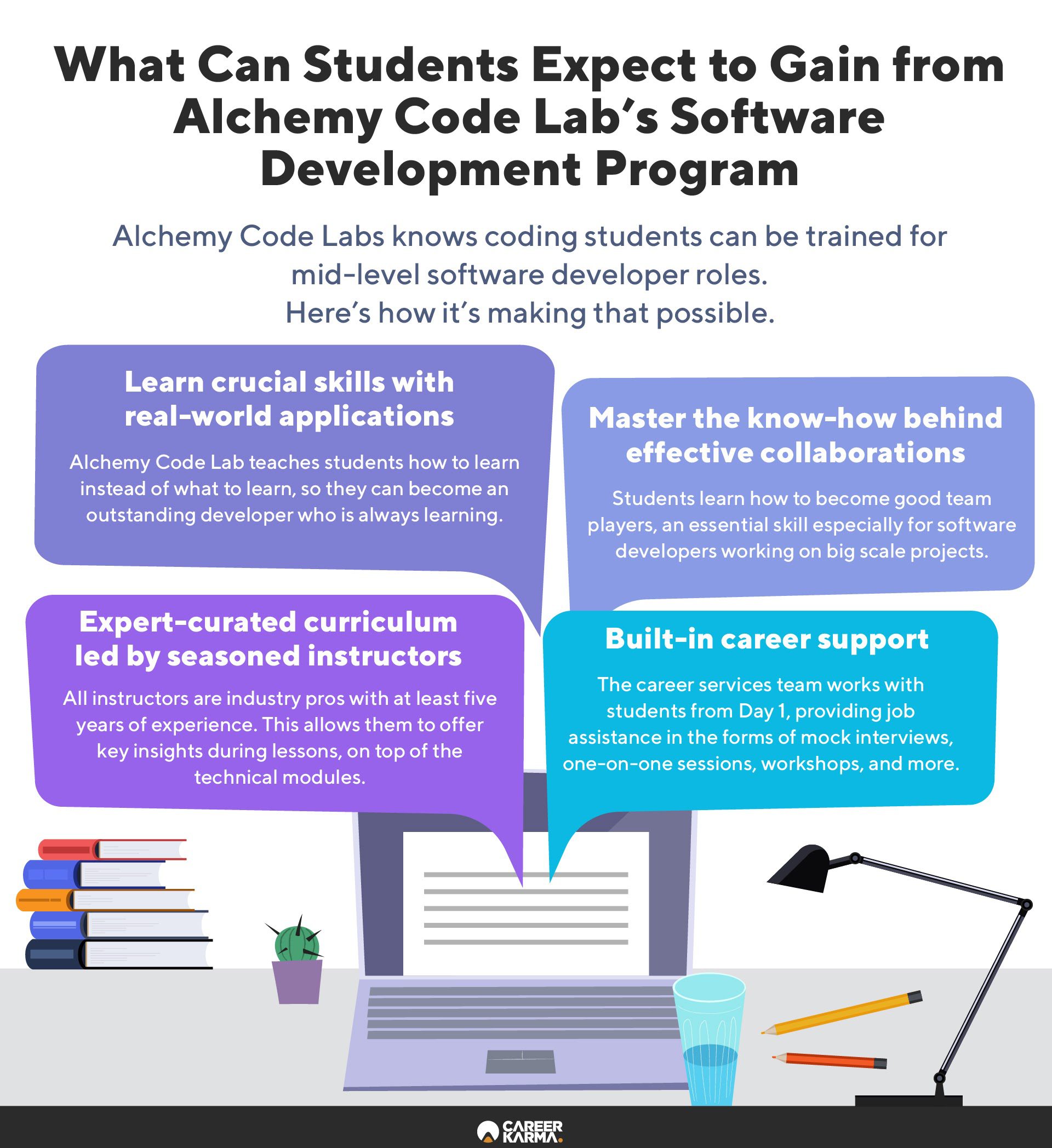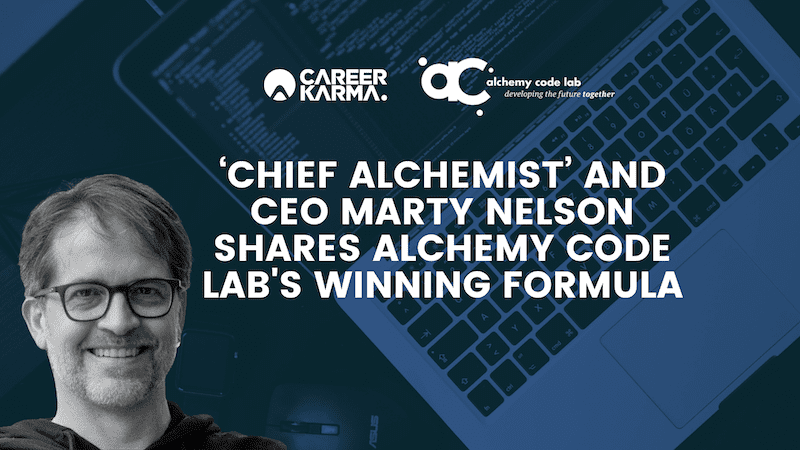If you are looking for a coding bootcamp that is engaging, with real-time instruction and daily interaction, then Alchemy Code Lab may just be the place for you. If you need any amount of convincing, look no further than the experience of its CEO, Marty Nelson.
Marty himself had an interesting transition into tech. He started with a degree in Art History and mostly worked in the service industry before discovering software development in 1999. Since then, he said he has “never had a boring day.”
“A lot of the things we teach are based on my success in the industry,” Marty says. “I came to software development from a nontraditional background as an art history major. There’s a natural advantage for people from nontraditional backgrounds because people coming from other jobs tend to have a good understanding of what is valuable to a business.”
From a Senior Software Architect to a Principal Instructor, Marty has worn multiple hats over the past 20 years. His achievements led him to establish Alchemy Code Lab, a platform where tech hopefuls from all backgrounds can build robust technical skills and gain competency to succeed in the tech world.
Alchemy Code Lab offers an expert-led software development program that is designed with career changers and all kinds of learners in mind.
Apply to Alchemy Code Lab today.How Alchemy Code Lab Prepares Students for Software Development Roles
The structure of Alchemy Code Lab’s Professional Software Developer Program is formulated based on Marty’s observations of industry trends over the past two decades and his extensive experience in tech. And, much like bootcamp students, his success did not begin with a computer science degree.

Understanding What Makes a Good Developer
Marty noticed good developers were not just the ones who knew specific programming languages or held computer science degrees. Instead, they were the ones who were able to break complex problems into pieces and adopt better coding practices like test-driven development, writing maintainable code, and refactoring.
In Marty’s words, “It’s not what you know; it’s what you can figure out”. That’s why Alchemy Code Lab emphasizes problem-solving, instead of just tutorials or writing lines of code.
On top of learning a specific coding language, Alchemy Code Lab students learn how to learn, build fluency, identify patterns, and ask questions to figure out how to get unstuck, which is a normal part of software development. The school wants to give students the know-how to seamlessly upskill following industry trends as they move along the career ladder.
Teaching Skills with Real-World Applications
Drawing from his own experience, Marty ensures that Alchemy Code Lab’s teaching methods can produce outstanding developers, capable of delivering good results and adding value to the companies that hire them or any team they join.
He strives to ensure that what students learn is applicable in real-life settings. To keep them engaged in the training, he tries to make sure that the software development classes are also interesting and fun. The work is meant to be intellectually stimulating, meaningful, impactful, and a genuinely good opportunity for economic mobility.
He says, “Overly theoretical programs, sloppy coding practices, no exposure to collaborating with other developers, or simplistic exercises—they just don’t push students to learn how to do the hard things that software developers need to learn how to do.”
At the same time, Alchemy Code Lab is transparent about the expectations of the industry versus what a coding bootcamp can provide. He stresses the importance of continued learning for those looking to build a long-lasting career in tech.
“We let students know that the bootcamp will not be able to train them in everything they will ever need to know…The truth is, even the very skills they learn will become obsolete in an average of five years. You have to learn how to be a good developer who is always learning, not just learning a specific tech stack.”
The Alchemy Code Lab Difference
Marty’s vast experience working with developers and aspiring developers is one of the main reasons why students should choose Alchemy Code Lab. He has incorporated the insights he gained in large-scale organizations with dozens of distributed teams into how he teaches.
“It’s not syntax to be memorized, something to be learned by watching videos or working in limited sandboxes or online tutorials where students aren’t using professional tooling. It’s critical that people learn by doing the thing they’re training to do in all of its facets.”
Marty believes that the right way to teach software development is by creating opportunities to grapple with more complex, realistic development projects.
“That’s how you learn how to move through problems, get yourself unstuck, leverage teammates and independent research, and be responsible for your code’s validity and ability to be comprehensive to others. That’s the expectation students will face when applying for a job, and training them to do anything less is a disservice.”
Experienced Instructors
As a professional, Marty believes seasoned instructors should be an important standard. He says, “Who is doing the teaching matters. Students deserve feedback and modeling from people who have been working as software developers for at least five years professionally.”
All Alchemy Code Lab instructors have at least five years of industry experience. While this may not be the most common set-up for coding bootcamps due to factors like costs, the school believes instructors’ industry experience can add more value to the students.
“It is a central tenet that students deserve to learn from instructors who deeply understand what it takes to do software development as a job and who have a level of personal experience to pull from. We believe that how much instructors know will make a definite difference in how much they are able to teach.”
Collaboration Is Key in Software Development
At Alchemy Code Lab, the focus is on teaching students teamwork and team-building skills. This is because developers need to be adaptable when practicing their craft. For example, developers who are used to using basic tools might struggle to write complex code more simply for other teammates to also understand.
“They need to be able to write code not just for machines, but for fellow humans to comprehend, maintain, and update. A big part of being a developer is knowing how to problem solve and deal with unfamiliar territory. It’s a skill to be able to learn from others and find a way forward.”
Marty says that’s where good collaborative skills come into play. That’s why Alchemy Code Lab prioritizes both the technical and non-technical aspects of development in its approach. It teaches modern tech stack and also how to work on a team and independently as a high-quality developer.
Students can expect to learn:
- How to summarize technology problems to others succinctly, and accept and welcome code and project feedback
- How to approach system diagnosis and troubleshooting to deal with errors effectively
- How to scrutinize small details of code to find issues
- How to be autodidactic: working with and implementing technologies that are new to them
- How to exploit patterns and familiar technologies to deliver larger projects
- How to conceptualize a problem through non-coding means
Additionally, they will also be taught other problem-solving techniques, regular code maintenance and improvement, consistent code organization, process improvements, context switching, use of data structures, and more.
Built-In Career Services
Beyond these concepts, the career services component offered at Alchemy is unique. The team works with every single student throughout the program to build their career plan and develop their career prep skills.
Students will learn how to craft technical resumes that will grab recruiters’ attention and build their online presence. They will also engage in mock interviews, demo days, career-focused workshops, and more.
Past students, like Yuval Allweil, found the experience extremely positive. “Our Career Services Director was a huge asset in my job search. She provided excellent feedback on my resume and website, sent me job postings that she felt fit both my skill and personality, and was 100 percent committed to helping me get a job that wouldn’t just pay the bills, but would make me happy.”
Begin Your Coding Journey with Alchemy Code Lab
“It’s a great time for career switchers who really have a lot of non-technical work experience from other fields to add these highly desirable technical skills,” Marty says. “Many people feel like their current work has become repetitive or boring, so moving into software development is fun and challenging work where you can see the impact of what you do.”
Speaking of impacts, Alchemy Code Lab also boasts impressive job placement data: 88 percent of all job-seeking graduates have found employment in a relevant tech field, holding titles like Software Engineer, Software Developer, Full Stack Engineer, and Full Stack Developer.
If the Alchemy experience sounds like something you want to be a part of, you can start your application today. Be prepared to learn from experienced instructors, undertake complex projects, and upskill to be competitive in a global marketplace.
About us: Career Karma is a platform designed to help job seekers find, research, and connect with job training programs to advance their careers. Learn about the CK publication.




